表地点的介词at、on、in的用法
介词on、in、at 的用法
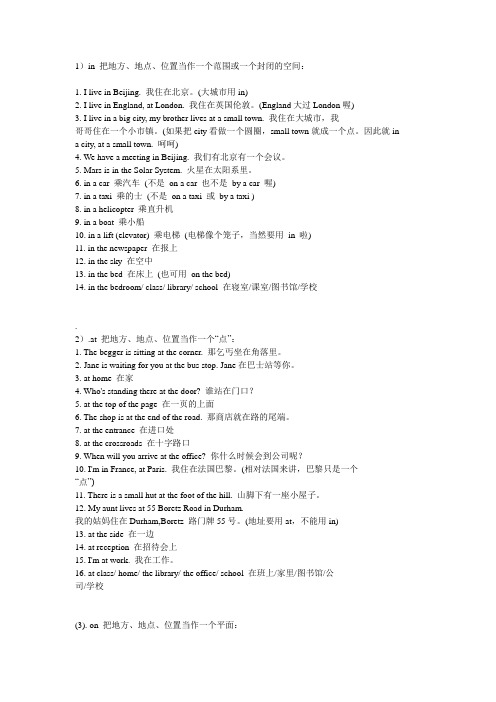
1)in 把地方、地点、位置当作一个范围或一个封闭的空间:1. I live in Beijing. 我住在北京。
(大城市用in)2. I live in England, at London. 我住在英国伦敦。
(England大过London喔)3. I live in a big city, my brother lives at a small town. 我住在大城市,我哥哥住在一个小市镇。
(如果把city看做一个圆圈,small town就成一个点。
因此就ina city, at a small town. 呵呵)4. We have a meeting in Beijing. 我们有北京有一个会议。
5. Mars is in the Solar System. 火星在太阳系里。
6. in a car 乘汽车(不是on a car 也不是by a car 喔)7. in a taxi 乘的士(不是on a taxi 或by a taxi )8. in a helicopter 乘直升机9. in a boat 乘小船10. in a lift (elevator) 乘电梯(电梯像个笼子,当然要用in 啦)11. in the newspaper 在报上12. in the sky 在空中13. in the bed 在床上(也可用on the bed)14. in the bedroom/ class/ library/ school 在寝室/课室/图书馆/学校.2).at 把地方、地点、位置当作一个“点”:1. The begger is sitting at the corner. 那乞丐坐在角落里。
2. Jane is waiting for you at the bus stop. Jane在巴士站等你。
3. at home 在家4. Who's standing there at the door? 谁站在门口?5. at the top of the page 在一页的上面6. The shop is at the end of the road. 那商店就在路的尾端。
表地点的介词atonin的用法

表地点的介词at、on、in到底怎么用【at、on、in的用法】一、at1、用在表示地域面积不大的某个点的地方(如饭桌旁、电影院、车站、机场等)前(to refer to a position or location which we see as a point)I was sitting at my desk、(当时我正坐在课桌旁。
)2、用在公司名称(侧重表达的就是工作的单位,而不就是工作地点)前(to talk about locations at compa nies, workplaces when we see them as a place of activity)How many people are working at Microsoft? (有多人在微软工作?)3、用在很多人参与的活动场合前(to refer to activities which involve a group of people)Were you at Lisa’s party/the cinema/the theatre? (您当时在丽莎的聚会上/电影院里/剧院里不?)4、用在学校前(with school/college/university)She always did well at school、(她在学校表现一直很好。
)5、用在具体地址、某人家里前(to refer to an address or someone's house)They once lived at number 12 South George’s Street、(她们曾经住在南乔治街12号。
)6、用在公共服务场所(to talk about public places where we get treatments, such as a hairdres ser’s or doctor’s surgery)I can’t meet at four、I’ll be at the hairdresser’s until five、(四点我无法跟您碰面。
介词in,at,on的用法 (2)
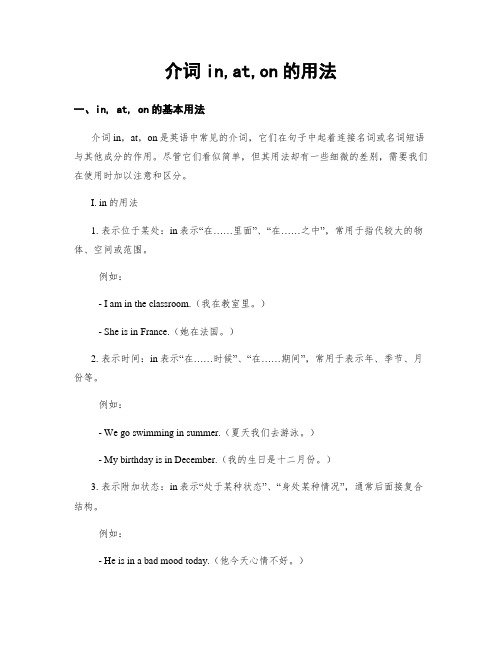
介词in,at,on的用法一、in, at, on的基本用法介词in,at,on是英语中常见的介词,它们在句子中起着连接名词或名词短语与其他成分的作用。
尽管它们看似简单,但其用法却有一些细微的差别,需要我们在使用时加以注意和区分。
I. in的用法1. 表示位于某处:in表示“在……里面”、“在……之中”,常用于指代较大的物体、空间或范围。
例如:- I am in the classroom.(我在教室里。
)- She is in France.(她在法国。
)2. 表示时间:in表示“在……时候”、“在……期间”,常用于表示年、季节、月份等。
例如:- We go swimming in summer.(夏天我们去游泳。
)- My birthday is in December.(我的生日是十二月份。
)3. 表示附加状态:in表示“处于某种状态”、“身处某种情况”,通常后面接复合结构。
例如:- He is in a bad mood today.(他今天心情不好。
)- The company is in financial trouble.(公司陷入了财务困境。
)II. at的用法1. 表示位置:at表示“在……地方”、“在某处”,常用于指代较小范围的地点、位置或具体场所。
例如:- She is waiting for you at the bus stop.(她在公交车站等你。
)- I will meet you at the cinema.(我会在电影院见你。
)2. 表示时间:at表示“在……具体时间点”,通常用于某一具体时刻、钟点或时间段。
例如:- The meeting starts at 9 a.m.(会议在上午九点开始。
)- I usually have dinner at 6:30 p.m.(我通常六点半吃晚饭。
)3. 表示动作进行的状态:at表示“正在进行某个动作”、“忙着做某事”,通常用于表示举止、动作进行中。
介词on,in,at的用法及例句
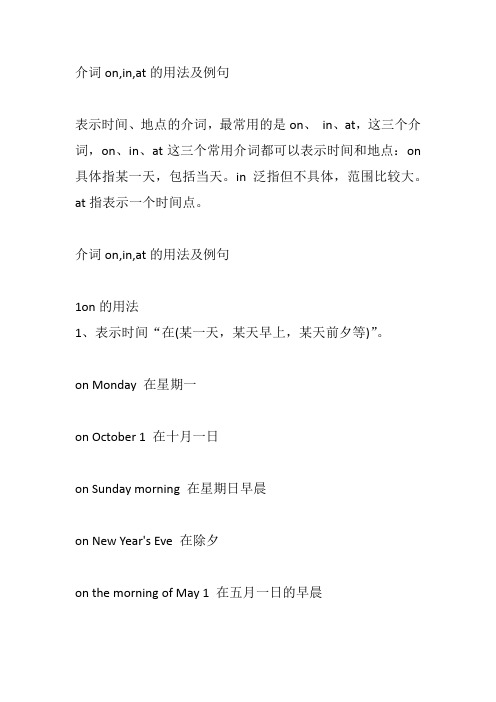
介词on,in,at的用法及例句表示时间、地点的介词,最常用的是on、in、at,这三个介词,on、in、at这三个常用介词都可以表示时间和地点:on 具体指某一天,包括当天。
in泛指但不具体,范围比较大。
at指表示一个时间点。
介词on,in,at的用法及例句1on的用法1、表示时间“在(某一天,某天早上,某天前夕等)”。
on Monday 在星期一on October 1 在十月一日on Sunday morning 在星期日早晨on New Year's Eve 在除夕on the morning of May 1 在五月一日的早晨He went home on Monday last week.他在上星期一回家了。
2、表示位置“在...上”(与物体接触)There is a map of world on the wall.墙上有一幅世界地图3、表示“关于”(表示关系)。
We will have a talk on the history of the Party this afternoon.今天下午我们有关于党史的报告。
What about your idea on the subject?关于这个问题你有什么看法?4、引申意义,表示“从事...”“处于...情况中”。
They are on holiday.他们在度假。
2in的用法1、表示时间(年、月、季节、早晨、下午、晚间等) in 1976 在1976年in October 在十月in spring 在春天in the morning/afternoon/evening 在早上/下午/晚上I will come in a week.我一周后回来。
2、表示地点、场所。
The bullet wounded me in the leg.子弹打伤了我的腿。
3、表示“穿着、戴着(衣服、帽子等)”。
The girl in red is Li Ming's sister.穿红衣服的女孩是李明的妹妹。
快速掌握地点介词In、on、at的方法

快速掌握地点介词In、on、at的方法快速掌握地点介词 In、On、At 的方法在英语中,地点介词是用来描述事物或人所在位置关系的词汇。
本文将为您详细介绍如何快速掌握这三个常用的地点介词:in、on、at。
一、介词 In 的用法1. 表示在某个范围内- I live in Beijing. (我住在北京。
)- There is a book in the bag. (书包里有一本书。
)2. 表示在某物体内部- There is water in the bottle. (瓶子里有水。
)- She is in the room. (她在房间里。
)二、介词 On 的用法1. 表示在某物体的表面上- There is a book on the table. (桌子上有一本书。
)- He put the cake on the plate. (他把蛋糕放在盘子上。
)2. 表示在某物体上部- There is a cat on the roof. (屋顶上有一只猫。
)三、介词 At 的用法1. 表示在某个特定点上- I will meet you at the airport. (我在机场等你。
)- She lives at No. 10 Downing Street. (她住在唐宁街10号。
)2. 表示时间点- I will call you at 8 o'clock. (我在8点给你打电话。
)总结通过以上详细解析,我们可以总结出:- In用于表示在某范围内或某物体内部。
- On用于表示在某物体的表面或上部。
- At用于表示某个特定点或时间点。
希望这份文档能帮助您快速掌握这三个地点介词的用法。
在日常英语交流中,灵活运用这些介词,能够更准确地描述事物或人的位置关系。
at on in 的地点用法

at on in 的地点用法at on in 的地点用法at、on、in 是英语中常用的地点介词,它们分别表示不同的位置关系。
正确使用这些介词可以让我们的语言更加准确和自然。
下面将详细介绍 at、on、in 的地点用法。
一、at 的用法1. 表示具体位置at 通常用于表示具体位置,如:- I am at home.(我在家)- She is waiting for me at the bus stop.(她在公交车站等我)2. 表示某个场所或建筑物at 还可以表示某个场所或建筑物,如:- We will meet at the restaurant.(我们将在餐厅见面)- He works at the hospital.(他在医院工作)3. 表示特定时间at 也可以表示特定时间,如:- The meeting is at 2 pm.(会议在下午2点举行)- I usually get up at 6 am.(我通常早上6点起床)4. 表示活动或事件的地点at 还可以表示活动或事件的地点,如:- The concert is at the stadium.(音乐会在体育场举行)- The party is at John's house.(聚会在约翰家举行)二、on 的用法1. 表示表面位置on 通常用于表示表面位置,如:- There is a book on the table.(桌子上有一本书)- The cat is sitting on the mat.(猫坐在垫子上)2. 表示日期on 还可以表示日期,如:- My birthday is on June 1st.(我的生日是6月1日)- We have a meeting on Monday.(我们星期一开会)3. 表示某个交通工具on 还可以表示某个交通工具,如:- I am on the train to London.(我在去伦敦的火车上)- She is on the plane to New York.(她在去纽约的飞机上)4. 表示某个节日或活动on 还可以表示某个节日或活动,如:- We celebrate Christmas on December 25th.(我们在12月25日庆祝圣诞节)- The fireworks show is on New Year's Eve.(烟花表演在除夕夜举行)三、in 的用法1. 表示三维空间内的位置in 通常用于表示三维空间内的位置,如:- The cat is in the box.(猫在盒子里)- He is in the room.(他在房间里)2. 表示城市、国家、地区等大范围的地点in 还可以表示城市、国家、地区等大范围的地点,如:- I live in Beijing, China.(我住在中国北京)- She is from a small town in the south of France.(她来自法国南部的一个小镇)3. 表示某个建筑物内部in 还可以表示某个建筑物内部,如:- There is a restaurant in the hotel.(酒店里有一家餐厅)- The library is in the school.(图书馆在学校里)4. 表示时间段in 还可以表示时间段,如:- We will have a meeting in an hour.(我们将在一个小时后开会)- I usually go to bed in the evening.(我通常晚上睡觉)总结at、on、in 是英语中常用的地点介词,它们分别表示不同的位置关系。
in,on,at地点和时间用法
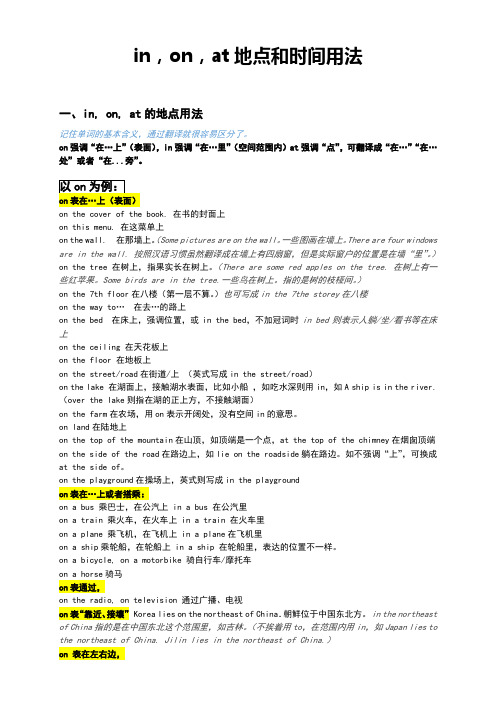
in,on,at地点和时间用法一、in, on, at的地点用法记住单词的基本含义,通过翻译就很容易区分了。
on强调“在…上”(表面),in强调“在…里”(空间范围内)at强调“点”,可翻译成“在…”“在…处”或者“在...旁”。
on the cover of the book. 在书的封面上on this menu. 在这菜单上on the wall. 在那墙上。
(Some pictures are on the wall。
一些图画在墙上。
There are four windows are in the wall. 按照汉语习惯虽然翻译成在墙上有四扇窗,但是实际窗户的位置是在墙“里”。
)on the tree 在树上,指果实长在树上。
(There are some red apples on the tree. 在树上有一些红苹果。
Some birds are in the tree.一些鸟在树上。
指的是树的枝桠间。
)on the 7th floor在八楼(第一层不算。
)也可写成in the 7the storey在八楼on the way to…在去…的路上on the bed 在床上,强调位置,或in the bed,不加冠词时in bed则表示人躺/坐/看书等在床上on the ceiling 在天花板上on the floor 在地板上on the street/road在街道/上(英式写成in the street/road)on the lake 在湖面上,接触湖水表面,比如小船,如吃水深则用in,如A ship is in the river.(over the lake则指在湖的正上方,不接触湖面)on the farm在农场,用on表示开阔处,没有空间in的意思。
on land在陆地上on the top of the mountain在山顶,如顶端是一个点,at the top of the chimney在烟囱顶端on the side of the road在路边上,如lie on the roadside躺在路边。
介词on、in、at 的用法
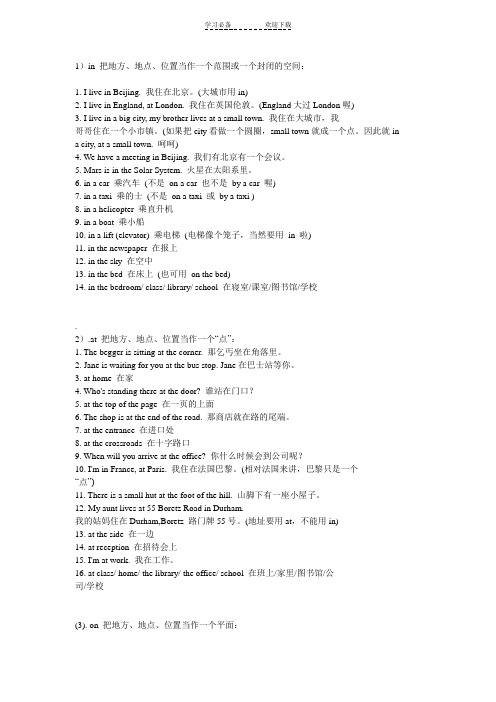
1)in 把地方、地点、位置当作一个范围或一个封闭的空间:1. I live in Beijing. 我住在北京。
(大城市用in)2. I live in England, at London. 我住在英国伦敦。
(England大过London喔)3. I live in a big city, my brother lives at a small town. 我住在大城市,我哥哥住在一个小市镇。
(如果把city看做一个圆圈,small town就成一个点。
因此就ina city, at a small town. 呵呵)4. We have a meeting in Beijing. 我们有北京有一个会议。
5. Mars is in the Solar System. 火星在太阳系里。
6. in a car 乘汽车(不是on a car 也不是by a car 喔)7. in a taxi 乘的士(不是on a taxi 或by a taxi )8. in a helicopter 乘直升机9. in a boat 乘小船10. in a lift (elevator) 乘电梯(电梯像个笼子,当然要用in 啦)11. in the newspaper 在报上12. in the sky 在空中13. in the bed 在床上(也可用on the bed)14. in the bedroom/ class/ library/ school 在寝室/课室/图书馆/学校.2).at 把地方、地点、位置当作一个“点”:1. The begger is sitting at the corner. 那乞丐坐在角落里。
2. Jane is waiting for you at the bus stop. Jane在巴士站等你。
3. at home 在家4. Who's standing there at the door? 谁站在门口?5. at the top of the page 在一页的上面6. The shop is at the end of the road. 那商店就在路的尾端。
- 1、下载文档前请自行甄别文档内容的完整性,平台不提供额外的编辑、内容补充、找答案等附加服务。
- 2、"仅部分预览"的文档,不可在线预览部分如存在完整性等问题,可反馈申请退款(可完整预览的文档不适用该条件!)。
- 3、如文档侵犯您的权益,请联系客服反馈,我们会尽快为您处理(人工客服工作时间:9:00-18:30)。
表地点的介词at、on、in到底怎么用
【at、on、in的用法】
一、at
1、用在表示地域面积不大的某个点的地方(如饭桌旁、电影院、车站、机场等)前(to refer to a pos ition or location which we see as a point)
I was sitting at my desk. (当时我正坐在课桌旁。
)
2、用在公司名称(侧重表达的是工作的单位,而不是工作地点)前(to talk about locations at comp anies, workplaces when we see them as a place of activity)
How many people are working at Microsoft? (有多人在微软工作?)
3、用在很多人参与的活动场合前(to refer to activities which involve a group of people)
Were you at Lisa’s party/the cinema/the theatre? (你当时在丽莎的聚会上/电影院里/剧院里吗?)
4、用在学校前(with school/college/university)
She always did well at school. (她在学校表现一直很好。
)
5、用在具体地址、某人家里前(to refer to an address or someone's house)
They once lived at number 12 South George’s Street. (他们曾经住在南乔治街12号。
)
6、用在公共服务场所(to talk about public places where we get treatments, such as a hairdr esser’s or doctor’s surgery)
I can’t meet at four. I’ll be at the hairdresser’s until five. (四点我无法跟你碰面。
我在美发店要呆到五点。
)
7、用在大部分商店前(to refer to most shops)
Look what I bought at the butcher’s today. (看看我今天在肉店都买了些什么。
)
8、用在旅途中经过的地点前(to refer to a place which is a part of our journey)
We stopped at a very nice village. (我们途经一个很漂亮的村庄。
)
9、用在不含day的节假日前(to refer to a holiday without “day”in its name)
People will always enjoy a big dinner at Christmas. (人们在圣诞节总会享用一顿大餐。
)
【特殊用法】
at home - at work-at the seaside - at sea (on a voyage) - at reception - at the corner of a street - at the back / front of a building / group of people, etc. - arrive at small places or some events
二、on
1、用在任何物体或地点的表面前(to refer to a position on any surface)
I know I left my wallet on the table. (我知道我把钱包落在桌子上了。
)
2、用在道路和河海湖前(to describe a position along a road or river or by the sea or by a l ake)
Dublin is on the east coast of Ireland. (都柏林位于爱尔兰的东部海岸。
)
3、用在建筑物的楼层前(to talk about a floor in a building)
They live on the 15th floor. (他们住在15楼。
)
4、用在公共交通工具前(to talk about being physically on public transport)
I was on the train when she phoned. (她给我打电话时,我在火车上。
)
注意:当我们描述旅游时选择的交通工具时,一般用by,如:He went to Paris by air. (他坐飞机去了巴黎。
) 但是,如果要表达走路,则用on foot。
5、用在小岛前(with small islands)
She spent her holiday on a small island. (她在一个小岛上度的假。
)
【特殊用法】
on the left - on the right - on the way - on holiday - on the radio - on television - on a horse - on the back / front of a letter / piece of paper etc.
三、in
1、用在某个地方的内部前(to talk about locations within a larger area)
I know my book is somewhere in this room. Can anyone see it? (我知道我的书就在这个房间的什么地方。
有谁看到吗?)
2、用在物理意义上的工作地点前(to talk about workplaces when we see them as a physical l ocation)
She works in an open-plan office. (她在一个开敞式的办公室里工作。
)
注意:当表示农场(farm)时,一般用on,如:I've always wanted to work on a farm. (我一直想在农场里工作。
)
3、用在class前(with class)
He found it difficult to concentrate in class. (他觉得很难在课上集中注意力。
)
4、用在国家、城市、县镇或其他地域前(with countries, cities, counties, towns or places as such) They live in New York. (他们住在纽约。
)
【特殊用法】
in the newspaper - in bed - in hospital - in prison - in the street - in the sky - in an arm chair (sit) - in a photograph - in a picture - in a mirror - in the corner of a room - in th e back / front of a car - arrive in a country or town
遇到失意伤心事,多想有一个懂你的人来指点迷津,因他懂你,会以我心,换你心,站在你的位置上思虑,为你排优解难。
一个人,来这世间,必须懂得一些人情事理,才能不断成长。
就像躬耕于陇亩的农人,必须懂得土地与种子的情怀,才能有所收获。
一个女子,一生所求,莫过于找到一个懂她的人,执手白头,相伴终老。
即使芦花暖鞋,菊花枕头,也觉温暖;即使粗食布衣,陋室简静,也觉舒适,一句“懂你”,叫人无怨无悔,愿以自己的一生来交付。
懂得是彼此的欣赏,是灵魂的轻唤,是惺惺相惜,是爱,是暖,是彼此的融化;是走一段很远的路,蓦然回首却发现,我依然在你的视线里;是回眸相视一笑的无言;是一条偏僻幽静的小路,不显山,不露水,路边长满你喜爱的花草,静默无语却馨香盈怀,而路的尽头,便是通达你心灵的小屋……
瑟瑟严冬,窗外雪飘,絮絮自语说了这多,你可懂我了吗?若你知晓,无需说话,只报一声心灵的轻叹,那,便是我的花开春暖。
你相不相信,人生有一种念想,不求奢华不求结果,不求你在我身边,只愿有一种陪伴暖在心灵,那,便是懂得。
有人懂得是一种幸福,懂得别人是一种襟怀,互为懂得是一种境界。
懂得,真好!。
